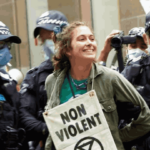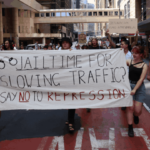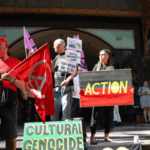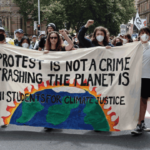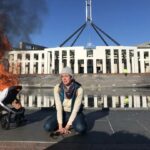We’re Going to Swing Between Increasingly Deadly Mass Fires and Floods, Warns Violet Coco
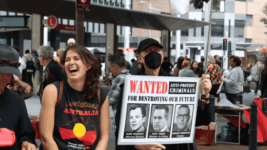
When Violet Coco returned to the Downing Centre Court on 13 December 2022 for a further bail application after initially having her bail refused, a huge crowd of representatives from various civil society groups galvanised into one movement, spurred on by their solidarity with the climate defender and against the state’s anti-protest regime.
This display revealed that NSW authorities had underestimated the support she’d garner after a magistrate sentenced her to 15 months prison time on 2 December, over a peaceful but disruptive direct action she took in April, which blocked a single lane of the Harbour Bridge for 25 minutes.
So sure was NSW premier Dominic Perrottet that the public would be onside that he appeared on television stating that her punishment was “not excessive” but rather “pleasing to see”, which simply underscored that the Liberal Nationals are protecting fossil fuel profits over the climate.
Coco, who is now out on bail pending the March appeal of her sentence, has been putting herself on the line via her climate protests for years now, and the NSW constituency was not prepared to watch her go down when she’s been doing all this to save the planet.
Authoritarian rule
Scientific evaluations have the planet reaching 1.5°C heating by 2030 and humanity is now on course to push the temperature to a 2.5°C rise on preindustrial levels, according to a recently released report by UN Climate Change.
Last March, Fireproof Australia was disrupting major roads in Greater Sydney, while Blockade Australia shut down Port Botany for five days straight. And it was at this point that the NSW Liberal Nationals government rolled out its severe anti-protest regime in response.
First suggested to the NSW roads minister by 2GB shock jock Ben Fordham on air, the new anti-protest laws were rammed through parliament in early April, so that those blocking a road, tunnel, bridge or major facility now look forward to up to 2 years prison time and/or a fine of $22,000.
As part of this uptick in climate action, Coco and other activists blocked a lane of the Harbour Bridge on 13 April, and it was for this nonviolent act that constituted little more than guerrilla theatre that she’s now looking at a minimum of 8 months inside.
For the love of planet
The new punishment recently imposed upon Coco is on top of the house arrest she’d already been subjected to as part of the extreme bail conditions she been issued after the bridge incident, which involved 126 days where her liberty was partially or, at times, totally restricted.
The April arrest marks the 28th time Coco’s been taken into custody for climate campaigning over recent years. And while she’s become the most prominent figure within the local climate movement, Violet is hardly the only one taking such drastic actions.
Sydney Criminal Lawyers spoke to Violet Coco a few days after she’d been released back into the community to discuss her desire to stay out of prison, the civil disobedience movements that she tips her hat to and whether stamping out the climate message will succeed.
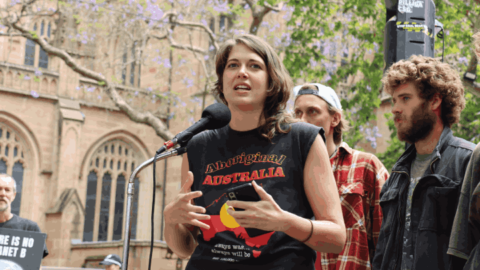
Violet, you’ve just spent 11 nights in Silverwater Correctional Centre. This is not the first time you’ve spent time in custody in relation to nonviolent climate actions, but it’s the longest stretch you’ve served.
What was prison like? And how do you consider the prospect of having to spend more time in there?
Prison is an awful place, and it’s so heartbreaking to see how much the system fails the people who are in there, treating them in a subhuman way.
I very much hope not to be spending any more time in prison. But what I hope for more is to see climate action.
Your imprisonment sparked widespread grassroots support. And this seems to have galvanised the climate movement, as different groups came together to unite in the call for your release, for the right to protest to be restored and for action to be taken on climate.
What are your thoughts on this outcome?
I’m so grateful for the support of so many people to make sure that I am home for Christmas.
And it’s really heartening and hopeful to think of the environmental protection movement working together because that can only be a good sign for our planet.
In a similar manner to your imprisonment, the new anti-protest regime appears to be driving a broader based movement.
I spoke to an anti-logging campaigner in Victoria this week, who said the same thing is happening there in relation to the Andrews government’s new protest regime.
What are your thoughts on these laws and the prospect that they’re strengthening the movement?
Throughout history, the conversation around the right to protest has always come alongside people protesting great injustices.
So, it’s not surprising that this conversation is having to be had at the same time that we are having to make a lot of noise regarding the habitability of our planet being at stake.
The threat that these laws pose in making people too afraid to protest is scary. But what we’re seeing is that people are being emboldened to fight for their rights, which is really heartening.
Your crime and punishment have served to draw attention to the climate crisis, but a lot of the discussion at present is around the laws and the sentencing rather than the broader issue.
How would you describe the state of the planet at present?
I tend to rely on the science, which is we’re reaching the endgame, and if we do not act on the climate and ecological emergency immediately, we are going to see hell on Earth conditions. And that really terrifies me.
These anti-protest laws are like taking out your smoke alarm when you have a fire instead of using a hose.
When you speak about the climate crisis, you speak with immediacy. Can you elaborate on how immediate we’re talking?
We have people like Sir David King, who two years ago said we have three to four years to change the trajectory of our current system, or we face the collapse of our liveable planet.
So, in reality, it is already too late for a lot of people, like the people in Lismore or those who suffered the fires, but there is a still a chance to change the trajectory and save a lot more.
We need to be acting urgently. Our government has known about the climate and ecological emergency for decades, and if we had acted on it when we first realised the threat that is being faced, then we would have had a much smoother and easier transition.
But because they have not acted upon it and they’ve failed us deeply, we now need to have an emergency speed transition.
We cannot move fast enough to protect the lives of the people in Australia and, indeed, around the world.
Australia is in what the scientists call “disaster alley”. We are going to see mass floods and mass fires and swing between those at increasingly deadly rates until we really begin to repair and heal this planet, which includes restoring ecosystems, not just stopping fossil fuels.
Do you think at the official level the climate crisis is still being spoken about as something in the future, whereas it’s something that’s already upon us?
The current policies in place are a death sentence to the majority of Australia.
Billions of lives are going to be lost if we don’t have immediate action and people are still beating around the bush and not really addressing the issue according to the science, which is we need to be doing this right now.
We spoke in August last year just after you’d been arrested for staging a demonstration out the front of Parliament House in Canberra.
You spoke about ANU Earth Science Professor Will Steffen’s warning that we’re facing “hell on Earth” and you also talked about the importance of civil disobedience movements, like the one led by Gandhi, as well as the Suffragettes and the Civil Rights movement.
Back then, you were talking about the need for such a movement. How do you consider that movement now?
It’s very clear that our democracy has failed us. We needed to be acting upon this years ago – decades ago. And our current system has not facilitated that.
So, we really need to be looking at better forms of democracy, like Citizens Assemblies, to be facilitating the change that is required to protect human lives.
Movements, like Extinction Rebellion, that are really calling for that better form of democracy that is going to see us have the changes that we need are definitely where I have been throwing my support.
There’s been a change of government in this country, which saw a nation that was one of the greatest climate pariah’s passing laws to reduce emissions as its first move under a new parliament.
But meanwhile, we’ve got this crackdown on climate protesters, which is also happening in the UK.
How do you see the state of play regarding governments and climate action at present?
Our government is still giving $22,000 a minute to the fossil fuel industry and, indeed, they were trying to pass new laws just this week to give the fossil fuel industry even more taxpayer dollars to support them.
So, I have no hope whatsoever in our current government actually doing what is required to protect Australians from the climate breakdown.
And lastly, Violet, will the forces trying to silence the message about the mounting crisis succeed?
What we have seen with the response to my imprisonment shows that they won’t succeed, that Australians won’t be gaslighted into believing they are the quiet Australians.
Australians are loud. We speak the truth. We won’t be silenced. And we won’t let these fear tactics stop us from a just outcome.


